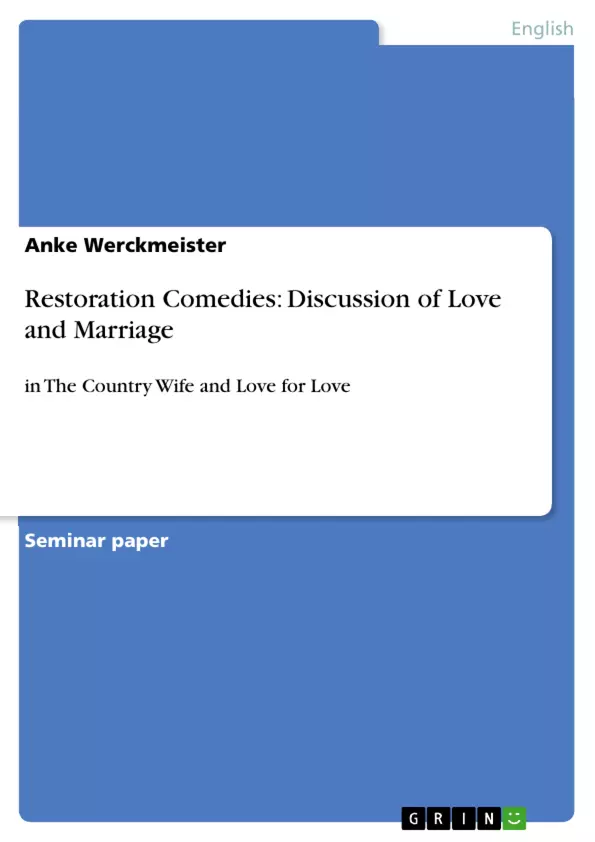Two Restoration Comedies that I want to discuss are William Wycherley’s The Country
Wife (1675) and William Congreve’s Love for Love (1695). Both plays were written in a time
when libertinism prevailed and male stereotypes like rakes and fops and female stereotypes
like wives and virgins were popular. Needless to say, both plays not only deal with
Restoration society but also with its problems, concerns, and difficulties at the time. And
especially, Love for Love, which was written fairly at the end of the Restoration era, still is a
conventional play in terms of being libertine-satirical but it already includes some features of
sentimentalism. So it is not a postponement from libertinism to sentimentalism yet, but I want
to argue in this essay that both plays are rather conventional libertine Restoration plays which
include features of early sentimentalism.
Table of Contents
- Introduction
- Love and Marriage
- Women and Marriage
- Men and Marriage
- Marriage Types
- Jealousy and Cuckolding
- Love Marriage
- Trick Marriage
- Mercenary Matches
- Love between Valentine and Angelica
- Love in Restoration Comedy
- The Country Innocence
- Town People
- Summary
- Cited Works
Objectives and Key Themes
This essay analyzes the portrayal of love and marriage in two Restoration comedies: William Wycherley's The Country Wife (1675) and William Congreve's Love for Love (1695). The essay aims to examine how these plays reflect the social and moral values of the Restoration era, particularly in relation to gender roles, relationships, and the prevalent concept of libertinism.
- The contrasting perspectives of men and women on love and marriage in Restoration society
- The portrayal of different marriage types and their social implications
- The role of libertinism and satire in shaping the comedic dynamics of the plays
- The emergence of early sentimentalism and its influence on Restoration comedic conventions
- The interplay between social expectations, individual desires, and the pursuit of pleasure in Restoration society
Chapter Summaries
The essay begins by exploring the complexities of love and marriage in the late seventeenth century, highlighting the distinct perspectives of men and women in the context of social expectations and changing moral values. It examines the prevalent notion of libertinism, contrasting it with the emerging ideas of sentimentality.
The essay then delves into the portrayal of different marriage types, examining the themes of jealousy, cuckolding, love matches, and mercenary marriages. It analyzes specific characters and their actions, shedding light on the social norms and conflicts that defined Restoration society.
The third chapter focuses on the role of love in Restoration comedy, exploring the contrasting lifestyles and perspectives of the "country innocence" and the "town people". The chapter examines how the plays use satire and humor to expose social hypocrisy and highlight the complexities of human relationships.
Keywords
The essay explores key themes such as love, marriage, libertinism, satire, sentimentalism, gender roles, Restoration society, and the social and moral values of the late seventeenth century. It also examines specific characters, including Horner, Margery Pinchwife, and Valentine, as well as the plays' satirical and comedic elements. These themes and characters serve as central points of analysis in the essay, contributing to a deeper understanding of the social and cultural context of Restoration comedy.
Frequently Asked Questions about Restoration Comedies
What are the primary plays discussed in this essay?
The essay focuses on William Wycherley’s "The Country Wife" (1675) and William Congreve’s "Love for Love" (1695).
How is marriage portrayed in Restoration Comedy?
Marriage is often depicted through various types, including mercenary matches, trick marriages, and the conflict between individual desire and social duty.
What is the role of the "rake" and the "fop"?
These are popular male stereotypes of the era; the rake is a libertine seeking pleasure, while the fop is overly concerned with appearance and fashion.
What is libertinism in the context of these plays?
Libertinism refers to a philosophy of social and sexual freedom that prevailed in the Restoration era, often used satirically in comedies.
Does "Love for Love" show signs of sentimentalism?
Yes, while it remains a libertine-satirical play, it includes early features of sentimentalism, marking a transition in comedic styles.
What is the "country innocence" trope?
It refers to characters from the countryside who are portrayed as naive or uncorrupted, contrasted with the cynical and sophisticated "town people."
- Quote paper
- Magister Anke Werckmeister (Author), 2007, Restoration Comedies: Discussion of Love and Marriage, Munich, GRIN Verlag, https://www.grin.com/document/202057



